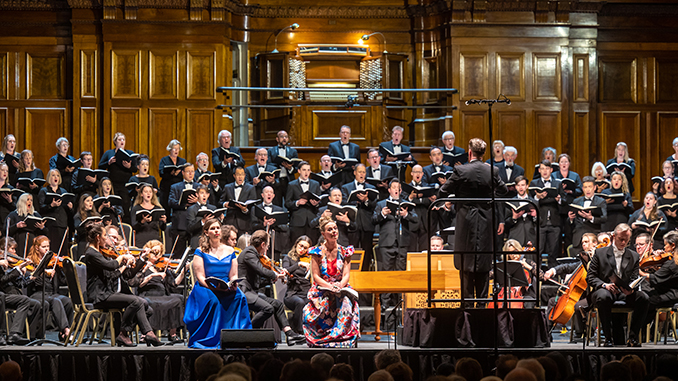 Messiah, glorious Messiah! Handel’s sublime oratorio and masterpiece of baroque choral music has arrived once again to decorate the Christmas season to great and meaningful effect that neither tinsel nor baubles can do.
Messiah, glorious Messiah! Handel’s sublime oratorio and masterpiece of baroque choral music has arrived once again to decorate the Christmas season to great and meaningful effect that neither tinsel nor baubles can do.
Composed in 1741 to an English scriptural text compiled by Charles Jennens, Messiah has showered its music on Melbourne since the city’s early colonial years.
Now in its 168th year of performing the work annually – a world record for the longest unbroken sequence of performances – The Royal Melbourne Philharmonic have a proud and strong association with the work. And it showed magnificently on Sunday evening at the Melbourne Town Hall.
In front of the hall’s backdrop of grand organ and timber panelling, the stage was orderly arranged for the more than 60 choristers tiered at the rear, more than 30 musicians to the centre and two soloists either side of the front of stage.
Smartly attired in black formals, the RMP Choir were a picture and sound of unity and precision, as vivid and lively in their delivery of the work’s broad range of vocal music as (excuse me) the colours of a coral reef. Handel‘s music for the choral verses is at the centre of the work to elevate the soul and inspire awe.
That is exactly what the choir achieved through unfaltering balance, vocal thrust, dizzying oscillations and particularly refined staccato, a credit to their commitment and to Artistic Director and Chief Conductor, Andrew Wailes.
Employing flexible tempi and conducting with energetic warmth, Wailes’ effective propulsion of the music revealed beauty of subtly and strength without over-exaggeration. Attentive and excellent to the end, the RMP Orchestra provided buoyancy throughout 150 minutes of music making.
The music resounded splendidly from their contingent of predominantly string players with harpsichord and floor organ and augmented with oboe and bassoon and hints of trumpet, timpani and grand organ that excite the soundscape indelibly.
Written in three parts, Part the First centres on the birth of a redeemer, Part the Second focuses on Jesus’ persecution, death and resurrection and Part the Third concerns the resurrection of the dead and glorification of Christ in heaven. Being religious or not, the text and music resonate for all and join us in a communal spirit of hope.
Turning to the soloists, Richard Butler opened with an accomplished Comfort Ye, his golden glinting tenor full of airiness and light at the top of the voice. Some projectional inconsistencies, most apparent in the lower range, took some of the shine away as Part the Second’s demands increased but the part’s penultimate Thou shalt break them rang with purpose and stature.
Firmly planted and commanding, sonorous baritone Christopher Hillier made impressive work of Part 2’s Though art gone up on high then a threateningly bold Why do the nations rage. Possessing a powerful instrument with the ability to manipulate it with well-wrought intensity and expressivity, Hillier finished with a noble and resonant The trumpet shall sound alongside all the finery of the trumpet, showcased in the expert playing by Christopher Grace.
Singing her material with searing and emphatic sculptural class, mezzo-soprano Dimity Shepherd shared the joy of engagement with her own music generously as well as sharing it with her fellow soloists and audience – a praiseworthy gesture of respect for her colleagues that didn’t go unnoticed in her summery floral gown.
Drawing palpable meaning and belief from the text, Shepherd exhibited every bit of the seasoned artist she is and nailed a magnificent Part the First He was despised to embed in one’s memory.
It felt like a long wait for the last of the soloists to take flight. In a royal blue gown and a jewelled asset to the performance, soprano Jacqueline Porter exhibited perfect poise as she rendered with calm and penetrating beauty Handel’s elegant writing for the part.
Porter seemed to effortlessly fill the enormity of the space with a voice of radiant and angelic purity and, once heard, you couldn’t wish but want to melt in it. Every note mattered.
A tingling and mountainous Hallelujah from the chorus, Shepherd’s throbbing He was despised, a sumptuous and floating How beautiful are the feet by Porter and a splendidly full-bodied Worthy is the Lamb with a rumbling conclusive Amen from the chorus – these were just a few of the many highlights in a concert that ignited the wondrous sense of being immersed in live music-making.
Both Messiah and RMP have stood the test of time. And what was written following a performance of the work in 1855, just two years after the institution’s establishment, could very well apply today.
“The Philharmonic Society, always meritorious and successful in its efforts to place before the Melbourne public satisfactory interpretations of the finest classical compositions, has just achieved a success which not only outshines all their former efforts, but we will venture to state, opens a new era in their existence and influence.” – The Age, 27 December 1855
Royal Melbourne Philharmonic: Handel’s Messiah 2021
Melbourne Town Hall, Swanston Street, Melbourne
Performance: Sunday 5 December 2021
Information: www.rmp.org.au
Image: Royal Melbourne Philharmonic (supplied)
Review: Paul Selar
